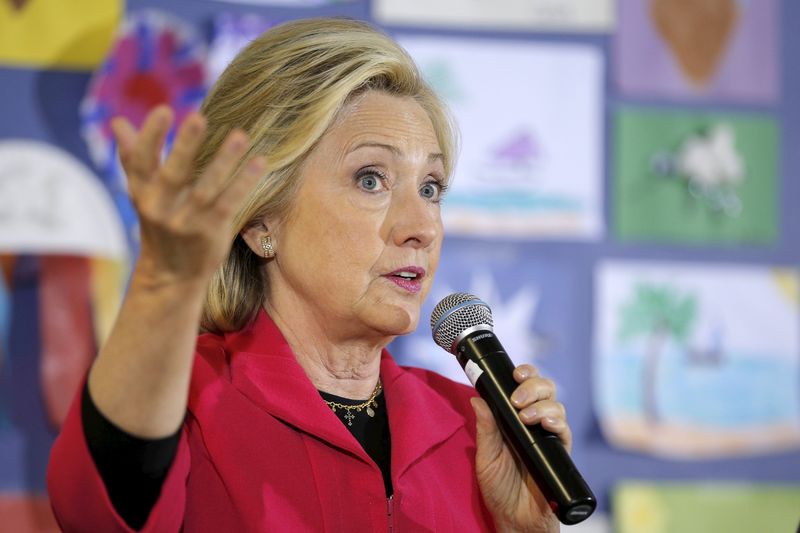By Krista Hughes, Richard Cowan and James Oliphant
WASHINGTON/CONCORD, N.H. (Reuters) - Hillary Clinton complicated President Barack Obama's quest for fast-track authority on his Pacific Rim trade pact by throwing her support behind fellow Democrats who staged a revolt against the measure last week.
Her criticism on the presidential campaign trail on Monday further dimmed hopes of reviving the White House's drive for a Trans-Pacific Partnership (TPP) in Congress, a key piece of legislation in Obama's second term.
"I believe that one of the ways the president could get fast-track authority is to deal with the legitimate concerns of those Democrats who are potential ‘yes' voters to see what's in the negotiation or even what's in the existing framework agreement that is being drafted, could be modified or changed," said Clinton, the Democratic presidential front-runner, on Monday in Concord, New Hampshire.
Obama's own Democrats derailed his push for authority to speed trade deals through Congress with a yes-or-no vote on Friday, casting doubt on the trade agreement central to the administration's pivot to Asia.
Although Republicans, who control Congress, kept open the option of scheduling a repeat vote on Tuesday, House of Representatives Majority Leader Kevin McCarthy said no decisions had been made about how to proceed.
Edward Alden, a trade-policy expert with the Council on Foreign Relations, that any late tweaking of the deal to appease Democrats could cost the trade pact broad support elsewhere.
"In doing what Secretary Clinton is recommending here, the administration could well lose the support they have on the Republican side," Alden said.
Alden doubted the deal could be altered enough to win the support of organized labor, which mounted a huge campaign against the pact.
"There's no combination that the administration could really offer to get the AFL-CIO to support the deal," he said.
Since her campaign entered a more expansive phase with her Saturday address in New York City, Clinton has made it clearer that she is actively courting the left wing of the Democratic Party, which fears the trade deal would hurt American workers.
The TPP is fiercely opposed not only by labor but by environmental groups and liberal activists who want improved human rights in Asia.
Despite her recent remarks, Clinton has attempted to tread cautiously on TPP, given the support for the pact by the White House and the U.S. business community.
Time is running out to secure fast-track authority, which restricts lawmakers to a yes-or-no vote on trade deals, and wrap up the TPP pact so it can pass Congress this year, before 2016 presidential elections begin to dominate the political and policy agenda.
White House spokesman Josh Earnest said the administration was working to "help Democrats and Republicans on the Hill figure this out," but was not pushing any particular legislative solution.
Obama put in a phone call to House Speaker John Boehner on Monday, Earnest said. The president also spent the weekend playing golf, hosting a private concert with singer Prince and attending a dance recital featuring one of his daughters.
"The president continues to be confident that we will navigate this particular procedural snafu and move this across the finish line," Earnest said.
Many Asia leaders have said it is vital that the United States be able to pass the trade pact if America wants to stay engaged and be taken seriously by the Asia Pacific region.

"Trade is strategy and you're either in or out," Singapore's Foreign Minister K. Shanmugam said on Monday. "It's very, very serious and your credibility - let's be frank about it - the president wants it, everybody knows this is important and you can't get it done? How credible are you going to be?"